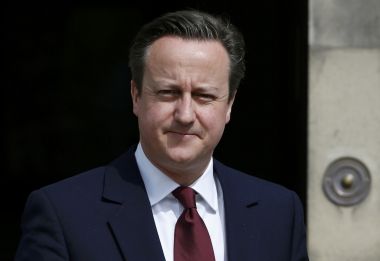Muslim extremism: Why David Cameron's views are dangerously naive

Why are young British Muslims going off to fight for a cause that involves burning people alive or chopping their heads off? Now we know, or at least we know what the Prime Minister thinks.
In a speech today, he said: "The cause is ideological. It is an Islamist extremist ideology: one that says the West is bad and democracy is wrong, that women are inferior and homosexuality is evil.
"It says religious doctrine trumps the rule of law and Caliphate trumps nation state, and it justifies violence in asserting itself and achieving its aims. The question is: how do people arrive at this world view?"
His answer is that "there are people who hold some of these views who don't go as far as advocating violence, but do buy into some of these prejudices – giving the extreme Islamist narrative weight and telling fellow Muslims 'you are part of this'".
It's this, he says, that has to change – and that is a very, very worrying idea.
It would be foolish to deny the force of the argument, superficially at least. Yes, it's possible, through a narrative of confrontation and rejection, to create a mindset in young people in which the leap from theory to action is not a very long one.
But Cameron's analysis fails because it doesn't understand the nature either of religious conviction or of a plural society. Because of that, it won't succeed in convincing Muslims that he has any answers to the radicalisation of their young people, and it is open to being used for radical curtailments of our personal freedom.
The problem is that he is a liberal-minded, tolerant and fair-minded sort of chap who for the life of him can't understand why everyone isn't just like him. So the answer to the radicalisation of young Muslims is for them to stop believing the things that make them different – to stop challenging the status quo and to become enlightened Westerners, with their religion reduced to a picturesque illustration of British multiculturalism rather than the vital and dangerous force that it is.
Dangerous? Yes. In modern democracies all true religion is dangerous, Christian as well as Muslim, because it challenges the powers that be. Christians marched against the Iraq war in their thousands, for all the good it did. Christians have protested against gay marriage, abortion and even against Muslims – James McConnell is facing prosecution in Belfast as a result. Of course, not all Christians, and many would find themselves out of sympathy with these causes. The point is that faith drives people to dissent. If you fit snugly into the prevailing narrative, which is liberal, consumerist, hedonist, capitalist and individualist, there's not much point in being a Christian at all.
Or a Muslim.
What Mr Cameron doesn't like is that Muslims do believe homosexuality is wrong. Well, so do many Christians. He doesn't like their treatment of women. Well, some conservative Christians have something called "complementarianism" (a weasel word if ever there was one; it's female subordination). He might like to check that out.
And he doesn't like the fact that Muslims in this country feel connected to Muslims in every other country. They're part of the "umma", the world-wide family. So yes, an attack by Christian countries on a Muslim country, and all the wretched consequences of the botched "peace" that followed, is going to be deeply felt.
The point is that if you're a religious person, you can't let the state tell you what to believe without losing your religion – and if you're serious about faith, that's not going to happen.
So what's the answer to the radicalisation problem?
First, it's to realise that it's not a problem. The word comes from the Latin "radix", or "root". People whose faith has roots are radicals. Telling them that things don't matter, when they know that they do, is monumentally stupid. Instead, those concerns need to honoured and addressed.
Cameron's bewilderment that "someone who's had all the advantages of a British or European schooling" and "the freedom to be who they want to be" could seriously chuck it all in to become a jihadi is deeply depressing. It's precisely the analytical tools that a good education has given them which has led them to that choice, because their education has failed to engage with their identity as Muslims rather than as enlightened liberal Westerners in the Cameron mould.
Second, it's not just a question of what someone believes: it's a question of how they believe it. There are reasons why it is so much harder to find a Methodist terrorist than a Muslim one.
There are plenty of Christians who are unbendingly orthodox in their beliefs and who would cheerfully go to prison, face financial ruin or even death rather than compromise them in the slightest. However: the vast majority of Christians are able to hold their belief in the absolute truth of the Gospel alongside a recognition that religion has to be chosen freely, and that everyone is of equal worth whatever they choose.
That has not always been the case, and it is not a distinction between Christianity and Islam: but it is true that more Muslims believe in the virtue of violence in the defence of their faith.
If Mr Cameron's government is unable to grasp how faith works, and how democracy works, the prospects for Muslims in Britain look bleak.











